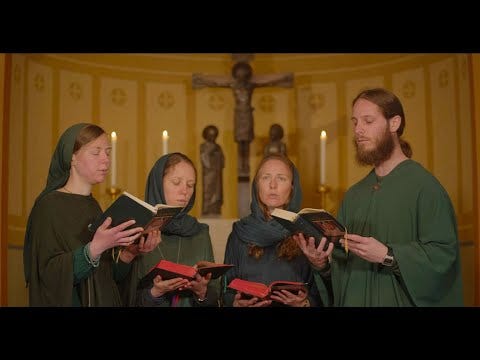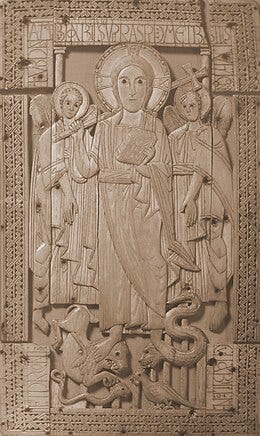“In these troubled and difficult times, it is important to anchor oneself even more deeply in God's love and protection. All human efforts to live in security and all attempts to find solutions in the most difficult crises (however justified they may be) are not capable of granting man a definite and stable security. In this video, we sing the Tractus (a chant sung in penitential seasons before the Gospel) which puts melody to Psalm 91 in Latin. We hope that the serene flow of this sacred chant will touch souls deeply, offering them God's comfort, whether in times of epidemic, war or whatever situation threatens us. According to the ancient monastic tradition, the Catholic Church intones this psalm at Compline (prayer at the end of the day). However, it goes back much further, to the time of the Old Covenant. Even in our own day it can convey to us the comfort that only the Heavenly Father is able to give us: to dwell in the shelter of the Most High in the midst of all tribulations.”
Harpa Dei
Psalm 91:
Psalm 91"He that dwelleth in the secret place of the most High"Psalm of protection
Late 8th century ivory plaque with Christ treading on the beasts, illustrating verse 13. From Genoelselderen
(in present-day Belgium).[1]
Language Hebrew (original)
Psalm 91 is the 91st psalm of the Book of Psalms, beginning in English in the King James Version: "He that dwelleth in the secret place of the most High shall abide under the shadow of the Almighty." In Latin, it is known as 'Qui habitat".[2] As a psalm of protection, it is commonly invoked in times of hardship. Though no author is mentioned in the Hebrew text of this psalm, Jewish tradition ascribes it to Moses, with David compiling it in his Book of Psalms. The Septuagint translation attributes it to David.
In the slightly different numbering system used in the Greek Septuagint and Latin Vulgate translations of the Bible, this psalm is Psalm 90.
The psalm forms a regular part of Jewish, Catholic, Eastern Orthodox, Lutheran, Anglican and other Protestant liturgies. The complete psalm and selected verses have often been set to music, notably by Heinrich Schütz and Felix Mendelssohn, who used verses for his motet Denn er hat seinen Engeln befohlen. The psalm has been paraphrased in hymns. The psalm was originally written in the Hebrew language. It is divided into 16 verses.
—Wikipedia





Gregorian chants, maybe especially in Latin, can bring forth demons in people. BUT--It's not the person, it's the demons in them, that react in anger. I'm quite serious. If somebody gets FURIOUS in the presence of this music, they may harbor demons that have not yet been expelled. Which is actually most of us. How exactly to get rid of them is more complex than some evangelicals like to pretend which frustrates me.
Bans are generally 24 hrs.
Strawberry—I did not delete all your comments. I banned you for 24 hrs and that command also deleted your comments.